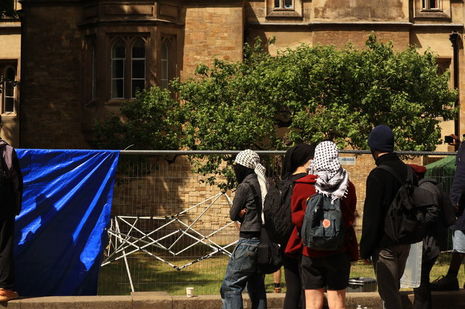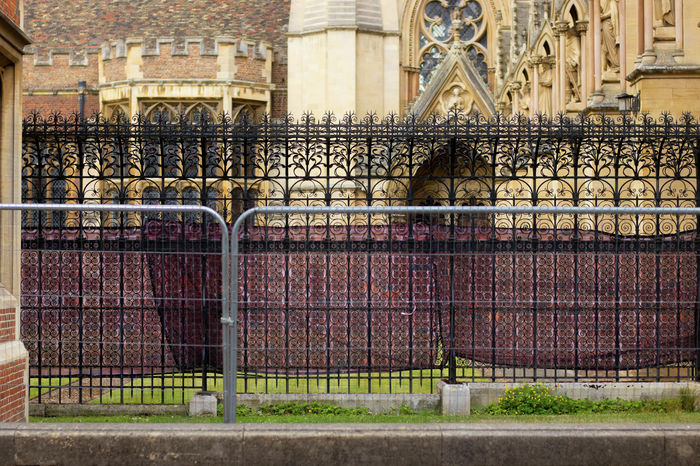Trinity and John’s seek injunctions against pro-Palestine encampment
Both Trinity and John’s have claimed that the encampment could be disruptive during the exam period

In the past week, St John’s College and Trinity College have evicted a pro-Palestine encampment and applied for injunctions against them.
Protesters set up an encampment on Newton’s lawn outside Trinity College on Friday (30/05), and held rallies protesting Trinity College’s investments and its links to Israel. One speaker claimed: “Israel would not be able to function, to do what it’s doing, without Cambridge University, without support from strong international institutions.”
A “emergency rally” was held at the Trinity encampment on Saturday (31/05). One speaker said that Trinity is “literally investing in killing children”.
On Monday (02/06), Trinity obtained an interim high court injunction, and the encampment was dismantled.
Protesters then moved to St John’s college, and established a camp on the lawn outside the College chapel. A Cambridge for Palestine (C4P) spokesperson justified the move to St John’s, alleging that a Freedom of Information request had revealed that the College held £3.2m in companies linked to arms and Israel, including BAE and Elbit Systems.
On Tuesday evening (03/06), John’s obtained its own interim injunction, and evicted the encampment with the support of police officers.
Varsity understands that law firm Bevan Brittan LLP is acting for the Colleges and that lawyer Kester Lees KC of Falcon Chambers has been instructed on the cases.
An initial hearing was held today (05/06) for both Colleges’ applications for an injunction, the result of which is unknown at this time. Until the final outcome of the cases is decided, an interim injunction will be in place at both Colleges, preventing future encampments.
In their application for an injunction, Trinity stressed the disruption the encampment caused students studying or taking exams. The application stated that students are examined “with end of year examinations (as opposed to ongoing assessments through coursework or similar) and does not offer the opportunity to re-sit examinations”.
Sally Davies, the master of Trinity College said in a witness statement that encampment created an “atmosphere of intimidation at the main entrance to the College,” adding that the College had received a “number of complaints” from its students.
Similar claims were made by John’s Master Heather Hancock, in the College’s injunction application. She said that students requiring access arrangements for exams are “especially vulnerable to noise disruption from the protest” in her witness statement.
During the hearings today, Kester Lees said that “any impact on a student’s grade will be an indelible mark for the rest of their professional life”.
Grant Kynaston, who supported the protesters on behalf of the European legal Support Centre, said that, should the court grant the injunction, it would be an “exceptionally wide-ranging and uncalibrated interference” with human rights, according to LBC.
Kynaston also criticised the Colleges’ decision to apply for an injunction, stating that “treating injunctive relief as the first, rather than the last, resort, is inconsistent with the high standard required of claimants seeking this form of newcomer relief, let alone with a rights-protective approach”.
C4P have condemned the actions of the Colleges, stating: “After a year of maintaining a facade of dialogue, marred by reneged promises and manipulated conversations, Cambridge has proudly and openly embraced the language of repression” in a post on their social media.
“Cambridge may fence off every lawn and green space, but the movement will not stop until divestment is achieved and Palestine is free,” the post continued.
This comes after the University was granted an injunction against protests in Greenwich House, The Old Schools, Senate House and Senate House Yard until the 26th of July.
 News / ‘Out of the Ordinary’ festival takes over Cambridge 26 August 2025
News / ‘Out of the Ordinary’ festival takes over Cambridge 26 August 2025 Comment / Who could possibly want more exams?25 August 2025
Comment / Who could possibly want more exams?25 August 2025 News / Council rejects Wolfson’s planned expansion28 August 2025
News / Council rejects Wolfson’s planned expansion28 August 2025 News / Council criticised after market plans announced27 August 2025
News / Council criticised after market plans announced27 August 2025 News / Tompkins Table 2025: Trinity widens gap on Christ’s19 August 2025
News / Tompkins Table 2025: Trinity widens gap on Christ’s19 August 2025










